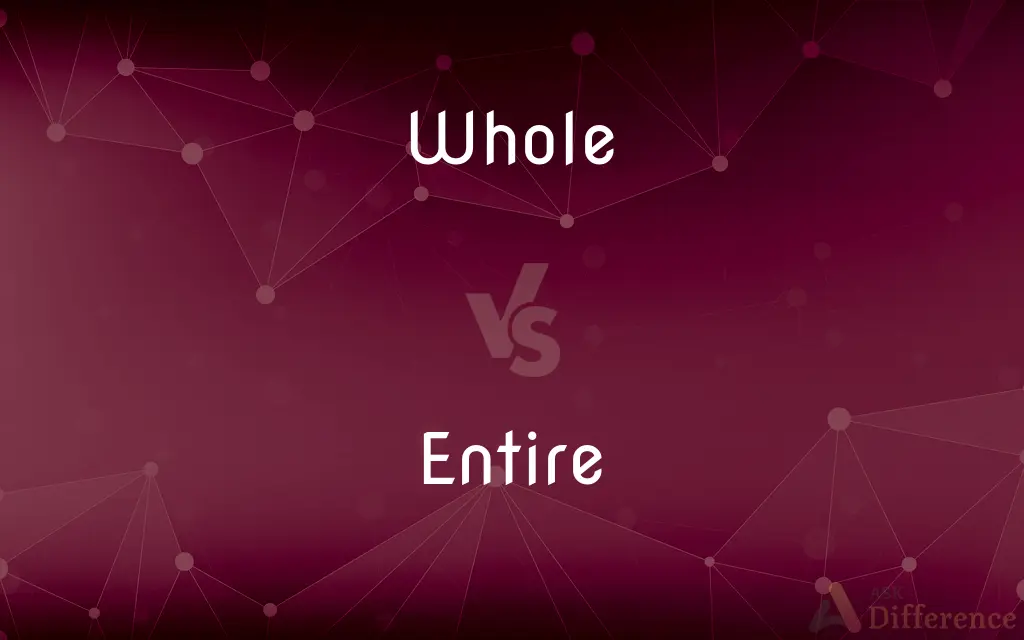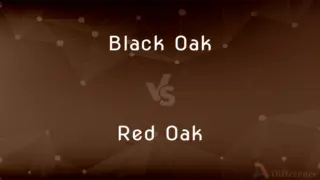Whole vs. Entire — What's the Difference?
Edited by Tayyaba Rehman — By Fiza Rafique — Published on October 27, 2023
Whole and Entire both mean "complete" or "not lacking," but "whole" often refers to something that remains undivided or unbroken, while "entire" emphasizes totality or fullness.

Difference Between Whole and Entire
Table of Contents
ADVERTISEMENT
Key Differences
"Whole" and "entire" are synonyms that often can be used interchangeably. However, "whole" usually emphasizes the completeness or undivided nature of something. For instance, one might refer to a "whole apple" when emphasizing that it hasn't been cut or divided.
"Entire," on the other hand, underscores the total, full, or absolute nature of something. Saying "the entire team attended the meeting" conveys that every single member was present, emphasizing the fullness.
In some contexts, "whole" might be used to describe something that remains intact, as opposed to being in pieces. For example, "The vase was sold as a whole" implies the vase was not broken or sold in parts.
"Entire" often comes into play when one is emphasizing that no part was excluded. For example, "He read the entire book in one day" means no page or chapter was skipped.
Both words are powerful in their own right, but their nuances can enhance the clarity and precision of a statement. For instance, saying "the whole group" might merely suggest a collective, while "the entire group" might suggest that absolutely no one was left out.
ADVERTISEMENT
Comparison Chart
Basic Definition
Complete or undivided
Total or full
Emphasis
Integrity, undivided nature
Completeness, no part excluded
Common Usage
Whole grain, whole fruit
Entire collection, entire lifetime
Collocation
Often with foods and objects
Often with periods of time or collections
Grammatical Use
Usually precedes the noun directly
Can be separated from the noun by adverbs
Compare with Definitions
Whole
All of something without division.
He ate the whole cake.
Entire
Having nothing left out; whole; complete.
She spent her entire savings on the trip.
Whole
A thing complete in itself.
The earth is a whole in the universe.
Entire
Constituting the full quantity or extent.
He was the entire reason for the party.
Whole
Containing all components; complete
The whole series of novels.
Entire
Unmitigated; pure.
It was an entire disaster.
Whole
Not divided or disjoined; in one unit
A whole loaf.
Entire
Having no part excluded or left out; whole
I read the entire book.
Whole
Constituting the full amount, extent, or duration
The baby cried the whole trip home.
Entire
Constituting the full amount, extent, or duration
We spent the entire day at the beach.
Whole
Not wounded, injured, or impaired; sound or unhurt
Many escaped the fire frightened but whole.
Entire
Not broken, decayed, or divided; intact
An old building with its roof entire.
Whole
Having been restored; healed
After the treatment he felt whole.
Entire
With no reservations or limitations; complete
Gave us his entire attention.
Whole
Having the same parents
A whole sister.
Entire
Not castrated.
Whole
A number, group, set, or thing lacking no part or element; a complete thing.
Entire
(Botany) Not having an indented margin
An entire leaf.
Whole
An entity or system made up of interrelated parts
The value of the whole was greater than the sum of its parts.
Entire
(Archaic) Unmixed or unalloyed; pure or homogenous.
Whole
Entirely; wholly
A whole new idea.
Entire
The whole; the entirety.
Whole
Entire, undivided.
I ate a whole fish.
Entire
An uncastrated horse; a stallion.
Whole
Used as an intensifier.
I brought a whole lot of balloons for the party.
She ate a whole bunch of french fries.
Entire
Whole; complete.
We had the entire building to ourselves for the evening.
Whole
Sound, uninjured, healthy.
He is of whole mind, but the same cannot be said about his physical state.
Entire
(botany) Having a smooth margin without any indentation.
Whole
(of food) From which none of its constituents has been removed.
Whole wheat; whole milk
Entire
(botany) Consisting of a single piece, as a corolla.
Whole
(mining) As yet unworked.
Entire
Complex-differentiable on all of ℂ.
Whole
(colloquial) In entirety; entirely; wholly.
I ate a fish whole!
Entire
Not gelded.
Whole
Something complete, without any parts missing.
This variety of fascinating details didn't fall together into an enjoyable, coherent whole.
Entire
Morally whole; pure; sheer.
Whole
An entirety.
Entire
Internal; interior.
Whole
Containing the total amount, number, etc.; comprising all the parts; free from deficiency; all; total; entire; as, the whole earth; the whole solar system; the whole army; the whole nation.
The whole race of mankind.
Entire
The whole of something; the entirety.
Whole
Complete; entire; not defective or imperfect; not broken or fractured; unimpaired; uninjured; integral; as, a whole orange; the egg is whole; the vessel is whole.
My life is yet whole in me.
Entire
An uncastrated horse; a stallion.
Whole
Possessing, or being in a state of, heath and soundness; healthy; sound; well.
[She] findeth there her friends hole and sound.
They that be whole need not a physician.
When Sir Lancelot's deadly hurt was whole.
All the whole army stood agazed on him.
One entire and perfect chrysolite.
Lest total darkness should by night regainHer old possession, and extinguish life.
So absolute she seems,And in herself complete.
Entire
(philately) A complete envelope with stamps and all official markings: (prior to the use of envelopes) a page folded and posted.
Whole
The entire thing; the entire assemblage of parts; totality; all of a thing, without defect or exception; a thing complete in itself.
"This not the whole of life to live,Nor all of death to die.
Entire
Porter or stout as delivered from the brewery.
Whole
A regular combination of parts; a system.
Parts answering parts shall slide into a whole.
Entire
Complete in all parts; undivided; undiminished; whole; full and perfect; not deficient; as, the entire control of a business; entire confidence, ignorance.
That ye may be perfect and entire, wanting nothing.
With strength entire and free will armed.
One entire and perfect chrysolite.
Whole
All of something including all its component elements or parts;
Europe considered as a whole
The whole of American literature
Entire
Without mixture or alloy of anything; unqualified; morally whole; pure; faithful.
Pure fear and entire cowardice.
No man had ever a heart more entire to the king.
Whole
An assemblage of parts that is regarded as a single entity;
How big is that part compared to the whole?
The team is a unit
Entire
Consisting of a single piece, as a corolla.
Whole
Including all components without exception; being one unit or constituting the full amount or extent or duration; complete;
Gave his whole attention
A whole wardrobe for the tropics
The whole hog
A whole week
The baby cried the whole trip home
A whole loaf of bread
Entire
Not gelded; - said of a horse.
Whole
(of siblings) having the same parents;
Whole brothers and sisters
Entire
Internal; interior.
Whole
Exhibiting or restored to vigorous good health;
Hale and hearty
Whole in mind and body
A whole person again
Entire
Entirely.
Whole
To a complete degree or to the full or entire extent (`whole' is often used informally for `wholly');
He was wholly convinced
Entirely satisfied with the meal
It was completely different from what we expected
Was completely at fault
A totally new situation
The directions were all wrong
It was not altogether her fault
An altogether new approach
A whole new idea
Entire
A name originally given to a kind of beer combining qualities of different kinds of beer.
Whole
Intact and not broken or damaged.
The toy remained whole after the fall.
Entire
Uncastrated adult male horse
Whole
Used to emphasize the novelty or distinctiveness of something.
That's a whole new way of thinking.
Entire
Constituting the full quantity or extent; complete;
An entire town devastated by an earthquake
Gave full attention
A total failure
Whole
With all its parts or elements.
We spent the whole day together.
Entire
Constituting the undiminished entirety; lacking nothing essential especially not damaged;
A local motion keepeth bodies integral
Was able to keep the collection entire during his lifetime
Fought to keep the union intact
Entire
(of leaves or petals) having a smooth edge; not broken up into teeth or lobes
Entire
(used of domestic animals) sexually competent;
An entire horse
Entire
Not divided or broken up.
The entire window was shattered.
Entire
Without any others being included.
He was the entire workforce of the company.
Common Curiosities
Which one is more formal, "whole" or "entire"?
Both words are standard English and neither is more formal than the other.
How is "whole" often used in the context of food?
It emphasizes undivided nature, e.g., "whole fruit" or "whole grain."
Does "the whole team" mean the same as "the entire team"?
Essentially, yes, though "entire" may emphasize more on full attendance.
How can "entire" emphasize purity?
By indicating something is unmitigated, e.g., "an entire success."
Can "whole" emphasize novelty?
Yes, as in "a whole new way of looking at things."
Do both words always precede nouns directly?
"Whole" usually does, but "entire" can be separated by adverbs.
Can "whole" and "entire" be used interchangeably?
Often yes, but "whole" emphasizes undivided nature while "entire" emphasizes fullness or completeness.
Can "entire" be used with periods of time?
Yes, e.g., "He worked there his entire life."
Can "entire" be used to describe an unbroken object?
Not typically. "Whole" is more appropriate for indicating something is intact.
Can "whole" indicate health?
In some contexts, e.g., "whole foods" indicate unprocessed foods.
Is "the whole of the group" the same as "the entire group"?
Both imply completeness, but "entire" may be more emphatic about no exclusions.
Is "whole" always used in a positive context?
No, e.g., "The whole idea was a disaster."
Can "whole" suggest a collective?
Yes, e.g., "the whole team" might suggest the team as a collective unit.
Does "entire" always mean 100% of something?
Generally, yes. It indicates fullness or completeness.
Can "entire" be used with abstract concepts?
Yes, e.g., "the entire purpose" or "the entire reason."
Share Your Discovery

Previous Comparison
Single Use Plan vs. Standing Plan
Next Comparison
Black Oak vs. Red OakAuthor Spotlight
Written by
Fiza RafiqueFiza Rafique is a skilled content writer at AskDifference.com, where she meticulously refines and enhances written pieces. Drawing from her vast editorial expertise, Fiza ensures clarity, accuracy, and precision in every article. Passionate about language, she continually seeks to elevate the quality of content for readers worldwide.
Edited by
Tayyaba RehmanTayyaba Rehman is a distinguished writer, currently serving as a primary contributor to askdifference.com. As a researcher in semantics and etymology, Tayyaba's passion for the complexity of languages and their distinctions has found a perfect home on the platform. Tayyaba delves into the intricacies of language, distinguishing between commonly confused words and phrases, thereby providing clarity for readers worldwide.
















































